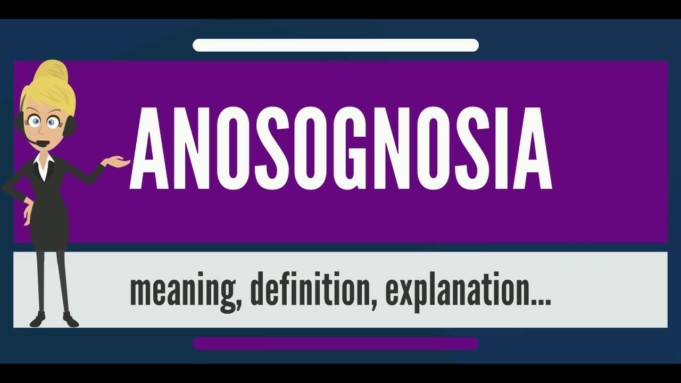It’s a well-known fact that many persons with severe cases of mental illness, like bipolar disorder or schizophrenia, don’t take their prescribed drugs. One primary explanation for this kind of nonchalant behavior to one’s health can be as a result of Anosognosia, a word of Greek origin that translates to “without knowledge of the disease.”
It can also be called “lack of insight.” But what it means is that the person is oblivious of their condition and incapable of accepting it. People with Anosognosia aren’t only living in denial or being obstinate. Due to damage to parts of their brains, they are unable to realize that their thoughts and moods don’t reflect reality.
People can often be uncomfortable acknowledging to themselves others that they have a condition they’ve been recently diagnosed with, this isn’t odd, and most eventually come in terms with their realities and accept their diagnosis.
But sometimes, the rejection can be long-lasting, and it’s not entirely denial that prompts a person to reject the facts. It’s a condition called Anosognosia, which means a lack of awareness or insight.
Anosognosia is the inability to understand or accept the truths of one’s condition. It’s when a person cannot acknowledge that they have a condition that matches up with their symptoms or diagnosis.
This can happen despite substantial evidence of a diagnosis, and even after second and even third medical opinions confirming the certainty of a diagnosis. Anosognosia is a result of changes that occur in the brain.
It’s not just stubbornness or denial, which people sometimes use as a defense mechanism when they receive a difficult diagnosis. In fact, Anosognosia is fundamental in conditions like schizophrenia or bipolar disorder.
Causes
Health Specialists believe Anosognosia can be outcomes of damage to an area of the brain involved in self-reflection. Everyone, however, their health status, is continually updating their mental image of themselves as one’s perception of themselves shifts throughout one’s lifetime.
So when one receives new information about them-self, for instance, one gets a promotion at work or gets a makeover or a scar — it factors into how one thinks about them-self. It’s a continuous, intricate process.
So for this to go smoothly, the frontal lobe has to be involved in this constant process of reshaping one’s self-image; the brain’s frontal lobe has to accept new information, organize it and utilize it to edit one’s self-image, and to remember that latest version.
And some mental health conditions can cause damages in the part of the brain, which can trigger frontal lobe tissue remodeling over time.
So when the brain’s frontal lobe is damaged eventually, one may lose the ability to take in new information and renew one’s perception of oneself or one’s overall health, which can often result because of neurological conditions like schizophrenia and bipolar disorder, the brain can no longer appropriately update one’s self-image.
Anosognosia isn’t always absolute.
Some persons partially lose the ability to see themselves completely, or it can sometimes occur off and on which can be confusing and emotionally draining for family, friends and loved ones as it can appear difficult to understand why someone seems to fully understand their diagnosis one moment, and later claim they’re perfectly healthy even though equitable evidence shows they aren’t.
Symptoms
The most outstanding symptom of Anosognosia is the absence of understanding, awareness, or acceptance of one’s medical condition even when there’s extensive evidence of their state of health. Here are some ways to differentiate between Anosognosia and denial or other responses to health conditions:
There’s no uniformity of symptoms in sufferers of this condition. Some may refuse to acknowledge their illness, while others prefer not to talk about the disease because they think no one believes them. Still, others may be confused or annoyed when they contradict what they believe to be true.
Anosognosia cannot be fixed as some persons can be conscious of their condition and treat it with medication. They may then abruptly become lose that awareness and miss an appointment or miss taking medication shortly afterward because they can no longer detect their condition.
Someone may even be aware of certain symptoms while unaware of others. For instance, someone with hemiplegia may not acknowledge that one side of their body is weak or paralyzed. But they may still know of symptoms like inability to speak well (aphasia) or loss of vision (hemianopia).
So family and friends are advised to observe the behaviors closely before and after a mental health diagnosis. Someone’s level of awareness can be different over time. This can make family and friends thinking that they’re just trying to ignore their condition to protect their emotions.
But it’s crucial to focus on the difference between a person’s personality and the symptoms of Anosognosia. Did they exhibit these behaviors before their diagnosis? Are they uncharacteristically determined in refuting their condition?
Diagnosis
The doctor may suggest that one sees a psychiatrist or other mental health specialist if one or a loved one is diagnosed with the condition that may be linked to Anosognosia. A specialist can monitor one’s overall mental health and any symptoms that arise.
A specialist may furthermore recognize Anosognosia early on. A specialist can detect even small behavioral shifts. One prominent evaluation technique is the “LEAP” method, which is done by:
- Listening to the patient
- Empathizing with the patient
- Agreeing with the patient
- Partnering with the patient
This procedure helps to open a conversation between a doctor and the person with Anosognosia. This enables the person to acquire an awareness of the true facts of their situation as well as realize that their friends and family around them are understanding and supportive.
Another well-known tool for diagnosing Anosognosia is the Scale to Assess Unawareness of Mental Disorder (SUM-D). This test places the idea of “insight” on a spectrum that includes:
- Awareness: Does the patient realize that they have a condition? Are they aware of the symptoms of their condition? Do theyunderstand that there may be societal consequences of their illness?
- Understanding: Does the person know that they require treatment?
- Attribution: Do they acknowledge that their symptoms stem from a mental health condition? A person’s SUM-D test findings may be able to demonstrate if a person is suffering from Anosognosia.
Neurological conditions associated with Anosognosia include:
- Hemiplegia
- Major depressive disorder
- Schizophrenia
- Dementia (including Alzheimer’s)
- Bipolar disorder
Anosognosia is most prevalent in schizophrenia. Around 57–98 percent [TrustedSource] of people with schizophrenia have some form of Anosognosia. Anosognosia is also especially noticeable in hemiplegia.
Someone suffering this condition may not understand that they have partial or full paralysis on one side of their body which can happen notwithstanding that they can observe that their limbs don’t move properly.
Why It Matters?
When someone with a severe mental illness believes they aren’t sick (or aren’t as ill as others say or think they are), a dangerous situation could result. Someone with Anosognosia is not likely to take their prescribed medication.
Why would a person take a drug (especially when the drug might have unpleasant side effects) if they don’t think there’s anything wrong with them?
When this person stops taking their prescribed drugs, their symptoms will usually return or get worse. Dependent on their condition, they might start hallucinating, acting recklessly, or even become suicidal.
They are also more likely to get arrested and become homeless. It is a known fact that many people with a serious mental illness, like bipolar disorder or schizophrenia, don’t take their prescribed medication.
One of the primary reasons for this behavior is Anosognosia, Someone with Anosognosia isn’t just in denial or being obstinate. Their brain can’t acknowledge the fact that their thoughts and moods don’t reflect reality.
Who’s at Risk of Anosognosia?
Anosognosia is common in people with mental illness. Doctors believe about 40% of people with bipolar disorder, and 50% of those suffering from schizophrenia have it.
Although some psychiatrists are of the opinion that the numbers are higher than that, they estimate that about 57%-98% of people with schizophrenia suffer from this disorder.
Many persons with other neurological disorders such as bipolar disorder have this condition. It isn’t unheard of for someone with Alzheimer’s to get it. Stroke patients often do, too.
Support for someone with Anosognosia?
Below are a bit of advice to help patients and their loved ones cope with Anosognosia:
It is advisable for one not to judge people suffering from Anosognosia and to know that this is a medical condition, not self-destructive tendencies or stubbornness.
Family members and friends should be supportive. Some days may be worse than others. Even if someone loses awareness of their condition, they’re not doing it intentionally. They need support and attention to make sure they get consistent treatment and keep up with their appointments and medications.
Keeping a detailed day to day documentation of what the person says and does can help one collect proof of the condition. This can not only assist someone who understands that they have Anosognosia but also provide the doctor with a basis for a treatment plan.
Treatment for Anosognosia
Anosognosia isn’t easy to treat. If one can persuade someone who has Anosognosia to continuing taking or start taking medication, then it can get better. About one-third of people with schizophrenia who take their medication see improvements in insight into their condition.
A therapist can also use a technique called motivational enhancement therapy (MET). This type of talk therapy is created to help someone see the benefits of changing their behavior.
If someone has Anosognosia, sometimes it’s advisable not to try to persuade them that they’re ill. One should instead focus and talk about their goals and plans, such as keeping a job or renting or owning properties. This might inspire them to see a mental health professional, even if they don’t understand they need it for their health and well-being.
Someone with Anosognosia can be at risk of self-harm or even harming others. If this is the case, a family member or mental health professional may have to take legal action. Laws vary by state, but one may have to admit someone with severe mental illness to the hospital against their will.
Seeking treatment from a counselor or psychiatrist soon after diagnosis of a mental health condition can be of tremendous benefit to someone suffering Anosognosia.
This condition can be exasperating to someone who may have relationship stress with their friends, family, or even co-workers or health complications because they aren’t aware of their condition.
Treatment for Anosognosia can be different centered on the cause. Common treatments can include the following:
Antipsychotic therapy
The doctor may prescribe medications called antipsychotics to treat indications of conditions like schizophrenia or bipolar disorder. Some types of antipsychotics that may be prescribed include:
- Aripiprazole (Abilify)
- Chlorpromazine (Thorazine)
- Clozapine (Clozaril)
- Loxapine (Loxitane)
Antipsychotics don’t work the same way for every patient so medication prescribed will always be based on one’s symptoms, overall health, and reaction to the drug. A patient may even need varied types of
antipsychotics throughout one’s life as the cognitive ability changes, or as the body responds to the drug differently over time.
Motivational enhancement therapy (MET)
MET uses techniques to motivate people suffering from anosognosia to either change their self-image to accept their diagnosis or encourage them to get treatment for their condition.
MET often involves helping someone look at their symptoms, behaviors, and relationships rationally. This time and again leads to comprehension and acknowledgment of the facts that point to the existence of a condition
The outlook
The outlook for conditions are linked with Anosognosia, such as schizophrenia, may be beneficial early on in treatment, but this is not without exceptions, and there is no cure for this condition.
Behavioral therapy, like the MET technique, can enhance the quality of life considerably by assisting people with anosognosia look at their signs from an objective standpoint. This can lead to changes in perception and behavior and ensure they follow the treatment plan for their underlying condition.
Reference and Citation;
- Anosognosia; Healthline, TAC, NAMI, Good Therapy













